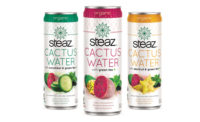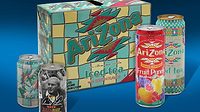Category Focus
New product varieties drive growth for plant waters
Coconut water fuels growth for the category

Image courtesy of Strange Water
Known as one of the most influential intellectuals of his time, Benjamin Franklin is quoted for having said, “Without continual growth and progress, such words as improvement, achievement and success have no meaning.”
Within the beverage space, when it comes to the “success” of plant waters, experts note that the market is experiencing “continual growth and progress.”
“Plant waters grew about 12% in retail dollars and 9% in volume in 2023,” says Roger Dilworth, senior analyst at Beverage Marketing Corporation (BMC), Wintersville, Ohio. “Retail sales exceeded $1.1 billion in 2023.”
According to a recent report from Research And Markets, titled “Global Plant-based Water Market 2024-2028,” the global plant water market is forecasted to grow by $1.27 billion during 2023-2028, accelerating at a compound annual growth rate (CAGR) of 19.64% during the forecast period.
Driving forces behind market growth include the launch of new product varieties and enhanced marketing efforts that promote plant water as a healthy and sustainable alternative to traditional beverages, according to the report.
Among key insights, the report also notes a tangible shift toward organic options, with consumers showing an increasing appetite for organic plant water, as well as preference for sparkling plant water varieties and growing popularity of plant water in the foodservice sector.
BMC’s Dilworth notes that plant-based diet trends have had an impact on plant water performance but to a limited extent.
“Coconut waters seem to be more driven by consumers’ penchant for healthy hydration,” he says. “This may explain why coconut water is performing much better than other plant water.”
Strange Water, a brand founded by Tal Ohana, and backed by his live events company Stranger Than, and NYC powerhouse promoter TCE Presents, recently entered the plant water space with the launch of its signature all-natural coconut water: Strange Water.
Aiming to fill the gap in hydration options at shows and in stores, Strange Water takes drinkers on tropical adventures with its original varietal and its all-natural sparkling solution in the category, the company says. Both varieties are sold in four-packs at select retail locations, providing a low-calorie and high-electrolyte profile to health-curious individuals looking for a refreshing recharge, it notes.
Also keeping with plant water market trends, Charlottesville, VA-based Caribe Juice, makers of WTRMLN WTR, recently announced the launch of WTRMLN ADE, a clean cold-pressed ultra-hydrating lemonade that harnesses the superpower of real watermelon.
Available in three flavors — Lemonade, Strawberry Lemonade and Limeade — each 12-ounce bottle packs 600 mg or more of electrolytes and touts 100% daily value of vitamin C, no added sugar, and half the calories and sugar of traditional lemonade, the company says.
“Everyone loves the taste of watermelon, but many consumers do not realize that watermelon is naturally packed with extraordinary amounts of electrolytes, especially potassium, as well as l-citrulline, an amino acid that aids in muscle recovery post-workout, and lycopene, an antioxidant powerhouse,” said Luis Solis, CEO of Caribe Juice, in a statement. “Having just wrapped up our second year in a row of double-digit growth, now is the perfect time to lean into WTRMLN momentum with new innovation.”

Coconut water fuels market growth
As plant-based waters can be healthy substitutes for traditional beverages, offering a significant quantity of nutrition, experts highlight how different types are performing in the market.
In its March 2024 report, “Plant-Based Water Market Size, Share, Growth, And Industry Analysis,” Business Research Insights notes that coconut water, maple water and birch water are the most popular globally.
According to the report, the global plant-based water market is expected to reach $10 billion in 2031, exhibiting a CAGR of 10.8% during the forecast period 2024-2031.
“During the projected period, the coconut water segment’s market share growth in flavored water will be substantial,” the report states. “Growth of the market for packed coconut water commodities, which will fuel market growth in the upcoming years, will be brought on by increased knowledge of the high nutritious value of coconut products in nations such as the United States, the United Kingdom, and many others.”
In terms of U.S market share, BMC’s Dilworth notes that “coconut water accounts for only about 0.1% of liquid refreshment beverage volume and 0.4% of retail dollar sales.” He adds that liquid refreshment beverages exclude milk and the non-RTD formats of tea and coffee.
Dilworth also notes that in the U.S. market, “none of the other segments, such as tree (maple and birch) and aloe are setting the world on fire. They all remain very niche with mixed growth results,” he explains. “The latter has not meaningfully broken out from its ethnic niche.”
As far as hybrid beverage trends contributing to the adoption of plant waters, Dilworth says that coconut water seems to have had the most impact on sports drinks, with some adoption by fruit beverage marketers.
“These are counted in those categories’ totals, however, and not toward coconut water,” he explains.
On a positive note, Dilworth notes that the plant water market is expected to grow in the 4 to 5% range for volume and retail dollars, with coconut water continuing to outpace other plant waters.
“Vita Coco has done a good job with its leadership position, and Harmless Harvest — although with super-premium price — has grown strongly lately,” he says.
With coconut waters leading the category, plant waters have more work to do to more broadly compete in the U.S. beverage market.
Looking for a reprint of this article?
From high-res PDFs to custom plaques, order your copy today!






